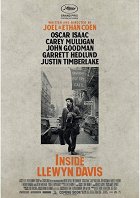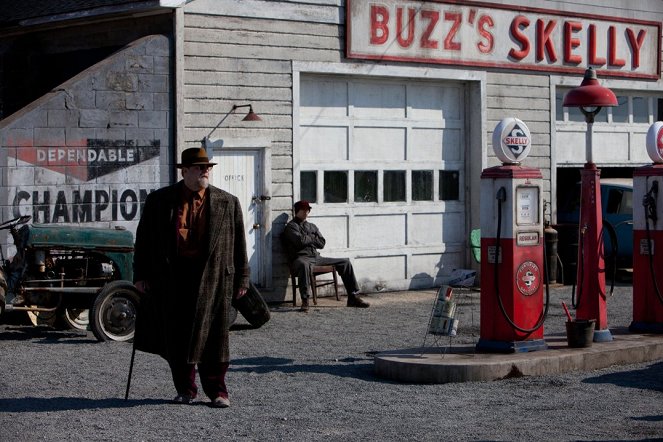Cinematography:
Bruno DelbonnelCast:
Oscar Isaac, Carey Mulligan, Justin Timberlake, John Goodman, Garrett Hedlund, Adam Driver, F. Murray Abraham, Max Casella, Ethan Phillips, Robin Bartlett (more)VOD (2)
Plots(1)
Follow a week in the life of a young folk singer as he navigates the Greenwich Village folk scene of 1961. Guitar in tow, huddled against the unforgiving New York winter, he is struggling to make it as a musician against seemingly insurmountable obstacles - some of them of his own making. (official distributor synopsis)
Videos (34)
Reviews (10)
Llewyn and I missed each other - not completely, but we just walked along the same sidewalk, and he talked and sang and I understood him, in every ironic gloss of his miserable self-centered life. Finally, he stopped, disappeared into a side alley, and then cried out that he didn't give a damn, that it suited him and he'd stay stuck there while I went on.
()
The saddest film by the Coen brothers with their unrivaled, least sympathetic protagonist. It sounds like a bittersweet folk hit about a guy who was out of it his entire life. You know exactly where the verse, the chorus and the specific rhyme belong. And that's the power of a simple song that crept under my skin like frost and the purring of a cat. Nothing profound, just a beautiful experience that needs no explanation / defense. [85%]
()
Inside Llewyn Davis is a film that has provoked remarkably contradictory reactions. Film critics nodded approvingly and spoke of the most fundamental music film of the decade, and perhaps the most fundamental film ever devoted to folk music. The music scene shook its head disapprovingly and claimed that it was not like that, or rather that it perceived that time, events, and places that were described completely differently. The reality is this: the Greenwich Village neighborhood has an exceptional place in American cultural tradition. It was the neighborhood of famous writers, freethinkers, and bohemians, where non-conforming individuals of all possible categories and social classes gathered. In the 1930s, they broke social taboos and opened the front door of the music club to African Americans. The local society consumed drugs and practiced free love long before the hippie movement emerged. In the early 1960s, the folk revolution started there. Numerous amateur enthusiasts emerged, clubs sprouted up like mushrooms after rain, and musical performances became common in bars and cafés. Folk blossomed and merged with rock and other genres. Today's musicians largely associate the birth of modern music, as we know it today, with Greenwich Village and the time period in which the film is set. In their eyes, it is an amazingly positive, innovative, energetic, and romantic matter. However, the Coens approached it from the other side. Every revolution has its victims and losers. Overnight, new stars overwhelmed familiar faces of the past, enthusiasts had no problem performing for free, and professionals found themselves without engagements. The directing duo loosely drew from the memoirs of folk singer Dave Van Ronk, who did not stand a chance in the fierce competition. In their interpretation, the story of the main character has a gloomy atmosphere; it is the story of a man who sinks to the bottom and doesn't know how to defend himself. It is a depressing matter where bleak prospects intertwine with the self-destructive character of the protagonist. Personally, I argue that it is one of the best Coen pieces, an intimate experience that I fell in love with. However, you will have to be okay with the fact that the film has a melancholic tone and a slow pace. Overall impression: 90%.
()
The Coen brothers in chill-out mode. This not very ambitious but pleasantly relaxing underground flick has no plot, but its atmosphere is excellent in places – especially during the brilliantly edited (including great work with sounds) car journey to Chicago, dominated by the film’s best character (played by John Goodman). As a whole, however, the film is unsatisfactory, it does not give the audience what it is waiting for. Factotum, also a story about an underdog/loser, was formally more conventional, but with more entertaining content.
()
A movie that, in my eyes, makes up for the fact that it talks about unpleasant life situations in an all-too-pleasant way. The steady pace of the episodic narrative is this time not disrupted (in a positive sense) by any exceptional supporting character or any charming filmmaking idea by which the Coens dissect the superficiality and get down to their typical atmospheric poeticism. Isaac is fine and the music is nice, though it will be appreciated mostly by folk enthusiasts older than 80 or so :) 70%
()



Ads